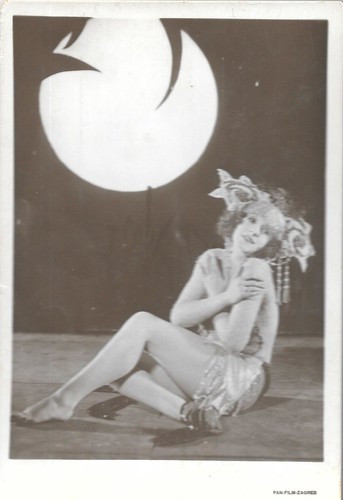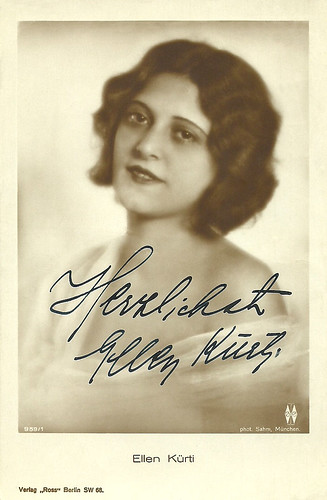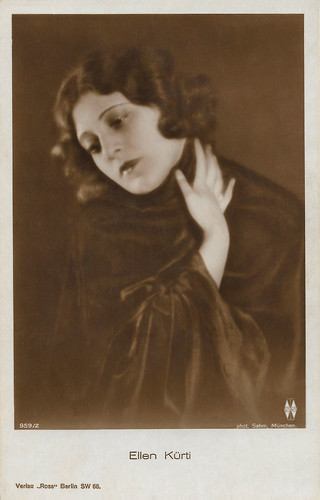
Yugoslavian postcard by Jos. Caklovic Bromografia, Zagreb, no. 17. Photo: Pan-Film, Zagreb.

Yugoslavian postcard by Jos. Caklovic Bromografia, Zagreb, no. 3. Photo: Pan-Film, Zagreb. Ellen Kurty in Mädchen, die man nicht heiratet/Girls You Don't Marry (Géza von Bolváry, 1924).
A blossoming film career in Germany
Little is known about the short life of Ellen Kürty a.k.a. Ellen Kürti a.k.a. Böske Kürthy a.k.a. Alice Pickford. She was born Erzsébet Kürthy in 1903 in Budapest, Hungary. She completed her schooling in Hungary and studied at the dance academy of Emilia Nirschy.
According to Hungarian Wikipedia, she debuted as Alice Pickford in the film A levágott kéz/The Severed Hand (Lajthay Károly, 1920). However, IMDb credits both Alice Pickford and Erzsébet Kürthy in the cast, so one of the sources is probably incorrect.
In Hungary, she also appeared opposite Vilma Banky in Veszélyben a pokol/Danger in Hell (Béla Balogh, 1921) and Galathea (Béla Balogh, 1921). Her final Hungarian film was A keselyü/The Vulture (Félix Vanyl, 1922), in which she was credited Böske Kürthy. Following the First World War, Hungary underwent a period of profound political upheaval and many people in the film industry left the country.
At only 19, Kürty continued her blossoming film career in Germany, first in Munich at the Emelka Film Studio and later at the Bavaria Film Studio. Among her first German films were Um Liebe und Thron/For Love and the Throne (Franz Osten, 1922) and Das rollende Schicksal/The Wheels of Destiny (Franz Osten, 1923) starring Colette Brettel.
In the following four years, she played a number of supporting and leading roles in Bavarian productions. She starred in the comedy Mädchen, die man nicht heiratet/Girls You Don't Marry (Géza von Bolváry, 1924) with Karl Beckersachs, She also played alongside film debutant Heinz Rühmann in the melodrama Das deutsche Mutterherz/The Heart of a German Mother (Géza von Bolváry, 1926). Her other Bavarian films include Die Liebe der Bajadere/The Love of the Bajadere (Géza von Bolváry, 1926), and Die Ehe einer Nacht (Robert Wohlmuth, 1927).

Yugoslavian postcard. Photo: Pan-Film, Zagreb. Collection: Didier Hanson.
Poisoning
Around 1927, Ellen Kürty went to Berlin, where she played leading roles in mostly minor productions. An exception was Richard Oswald's ambitious political production Feme/Assassination (1927) starring Hans Stüwe and Grete Mosheim.
She also appeared in the silent drama Erinnerungen einer Nonne/Memoirs of a Nun (Arthur Bergen, 1927) starring American actress Mary Nolan and in Dutch director Jaap Speyer's Hotelratten/Hotel Rats (1927) with Nils Asther and Mia Pankau.
Already in 1928, after a tiny role in the Henny Porten comedy Liebe und Diebe/Love and Thieves (Carl Froelich, 1928), Ellen Kürty's career was over. She made over 20 films in Germany.
Just before the sound film era began, Ellen Kürty retired from the film business. In September 1930, a Budapest newspaper wrote that Kürthy had poisoned herself because she had not been offered a new film contract.
Although the newspaper did not report on the outcome of the poisoning, Hungarian Wikipedia assumed that she died then. Ellen Kürty was only 27.

German postcard by Verlag Ross, Berlin, no. 959/1, 1925-1926. Photo: Sahm, München (Munich) / Emelka. Collection: Didier Hanson.

German postcard by Verlag Ross, Berlin, no. 959/2, 1925-1926. Photo: Sahm, München (Munich) / Emelka.
Sources: Wikipedia (Hungarian, German and English) and IMDb.
No comments:
Post a Comment